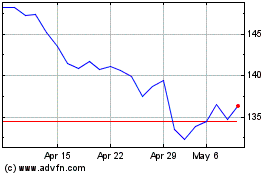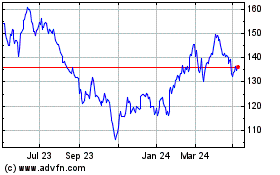By Eric Morath and Christina Rogers
Electric cars captured the spotlight at this year's Frankfurt
auto show, but there was still plenty of other buzz on the floor.
Here are the highlights.
Land Rover Drops the New Defender SUV
Land Rover made sure massive SUVs didn't get overlooked at a
show crowded with electric-vehicle debuts.
Land Rover marked the return of one of its most iconic
nameplates, the Defender, with a crowd-pleasing stunt. It sent a
helmeted rock climber up a rust-colored wall and then tipped the
wall down to reveal a gold-hued SUV, parked near the ceiling. The
Defender then proceeded to slowly roll down the wall at nearly a
45-degree angle, surprising onlookers.
"I give you back the new Defender -- the best ever," Jaguar Land
Rover Chief Executive Ralf Speth said Tuesday, acknowledging that
fans were crestfallen when the company canceled the prior version
four years ago.
This latest off-roader, which will come in multiple versions,
will have a hybrid option and pop-up middle seat in the front, a
feature designers believe will be popular among teenagers and large
dogs.
Byton Introduces SUV With Monster Media Display
Chinese automaker Byton aims to, in effect, put a big-screen
television in front of drivers as they move down the road.
The production version of the company's all-electric M-Byte
hatchback features a 48-inch display that stretches across the
dashboard from driver to passenger. The display can show vehicle
information, navigation, music selections, weather reports and
family photos while driving, and videos and text messages while the
car is in park.
Byton executives described the vehicle as a connected-car
gadget. The vehicle also has a 7-inch tablet computer in the
steering wheel and an 8-inch touchpad nestled between the front
seats.
Byton plans to put the M-Byte on sale in China in mid-year 2020
and in the U.S. and Europe in the first half of 2021. The car would
cost about 45,000 euros in Germany, or about $49,600.
Greenpeace Wants Even Greener Vehicles
Auto makers' promises of electric vehicles and a more
sustainable future didn't impress a handful of Greenpeace
protesters who assembled outside the auto show in Frankfurt.
Next to the media entrance, they inflated at 25-foot-tall black
balloon with 1,400 cubic meters of air -- the amount of
carbon-dioxide emitted from an SUV's tailpipe each year, said
Benjamin Stephan, one of the organizers. Even as auto makers add
more hybrid and plug-in models to their lineups, they are also
rolling out new SUVs that consume more gasoline, the protestors
said.
"That doesn't go along with their claims that they are now
climate conscious," he said. A larger protest is planned for
Saturday, when the show is open to the public, Mr. Stephan
said.
Trade Fights, China Slowdown Put Damper on Show Buzz
Amid thumping techno music and glitzy new-model reveals,
executives at the show continued to fret about other pressures
weighing on the car industry.
The ongoing trade fight between the U.S. and China is making it
difficult to plan for the future and disproportionately impacting
BMW and Daimler AG's Mercedes-Benz, which exports U.S.-built SUVs
to China.
"It's very difficult to know exactly what happens in
negotiations around the world," Daimler CEO Ola Källenius said. "So
we returned to watching it from the sidelines and, at the same
time, evaluating our options."
China's once-booming car market is entering its first sustained
slowdown in three decades, and industry CEOs say a near-term
rebound remains uncertain. This is on top of softening sales in the
U.S. and Europe.
Vincent Galifi, chief financial officer for auto-parts supplier
Magna International, said the weakness in China has caught many by
surprise. For the top 30 vehicles, to which it supplies parts,
factory output was lower in the first half this year, prompting the
company to revise its estimates downward for the remainder of
2019.
"But we're starting to see things stabilize, so that's a good
thing," he added.
New VW and Porsche Electric Cars Steal the Spotlight
Volkswagen made a big splash at the show with two high-profile
unveilings: The new VW ID.3 all-electric car, and the Porsche
Taycan, the luxury sportscar maker's first fully electric
model.
The ID.3 is the Volkswagen brand's attempt at a more-affordable
electric car that can be sold in large volumes, helping to broaden
the technology's appeal beyond niche buyers.
The car, already available for pre-order in Europe, starts at
around 30,000 euros ($33,000). It won't be sold in the U.S -- but a
small SUV based on the same technology is making its public debut
early next year and will later arrive in U.S. dealerships.
The Taycan, a powerful, four-door sedan that can travel more
than 200 miles on a single charge, will hit U.S. dealerships next
year. Many in the auto press were quick to deem it the latest Tesla
competitor even though it would cost far more than the most
expensive Tesla models, with a starting price around $150,000.
Write to Eric Morath at eric.morath@wsj.com and Christina Rogers
at christina.rogers@wsj.com
(END) Dow Jones Newswires
September 11, 2019 11:33 ET (15:33 GMT)
Copyright (c) 2019 Dow Jones & Company, Inc.
Volkswagen (TG:VOW)
Historical Stock Chart
From Mar 2024 to Apr 2024

Volkswagen (TG:VOW)
Historical Stock Chart
From Apr 2023 to Apr 2024
